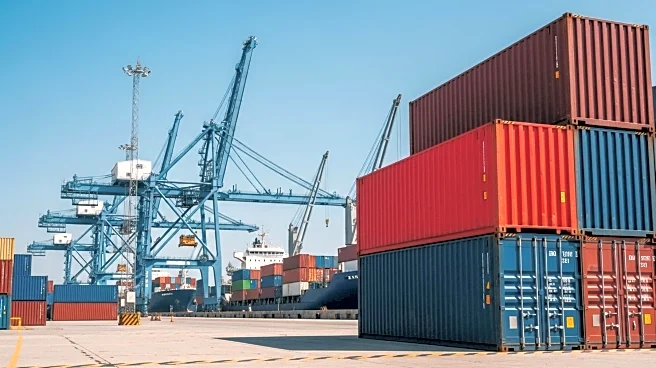What is the story about?
What's Happening?
The Trump administration has officially ended the tariff exemption for global parcel shipments valued under $800, effective as of Friday. This change is set to disrupt supply chain models for various businesses, as the U.S. Customs and Border Protection (CBP) agency begins collecting normal duty rates on all global parcel imports, regardless of their value. The exemption, which was initially raised from $200 to $800 in 2015 to support small business growth on e-commerce platforms, has been permanently revoked. The administration cites the need to restrict the flow of narcotics and other prohibited items into the U.S. as a key reason for this decision. Additionally, the move is expected to generate up to $10 billion annually in tariff revenues. A six-month transition period has been established, allowing postal service shippers to opt for a flat duty rate of $80-$200 per package, depending on the country of origin.
Why It's Important?
The removal of the de minimis exemption is significant as it affects the direct-to-consumer business model that many e-commerce firms have adopted, particularly those shipping from China. This change could lead to increased costs for consumers and businesses relying on international shipments. The decision is also part of broader efforts by the Trump administration to address the influx of fentanyl and its precursors into the U.S., which have been linked to the exemption. The CBP has reported a substantial increase in packages claiming the exemption, from 139 million in fiscal 2015 to 1.36 billion in fiscal 2024. The new tariff policy could impact international trade relations and postal services, as foreign postal agencies must adapt to the new duty collection methods.
What's Next?
Foreign postal services are required to transition to full 'ad valorem' duty collection based on shipment value by February 28, 2026. Some foreign postal services have already suspended mail to the U.S., but the administration is working with international partners and the U.S. Postal Service to minimize disruptions. The UK, Canada, and Ukraine have confirmed that their shipments to the U.S. are continuing. Express carriers like FedEx, UPS, and DHL will be responsible for collecting duties and processing paperwork, which may lead to logistical adjustments and potential delays in international shipping.

















